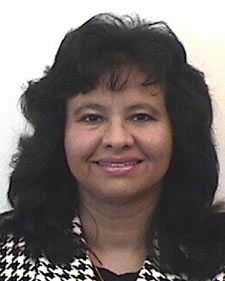CDC Women in STEM Careers - Sandra Steiner, PhD
Microbiologist and Scientific Clearance Officer
Office of Public Health Preparedness and Response, CDC

When she was growing up in Colombia, Sandra Steiner first wanted to be a mechanic. But she ended up studying microbiology because she had always excelled in science. It turned out to be the right choice
Science has shaped her life, providing a fun career as a CDC research biologist who works on vaccines to protect people from pneumonia and other illnesses.
On the diversity of her work, she says, “I have studied vaccines in infants and adults; HIV-infected, sickle cell, and bone-marrow transplant patients, and native Alaskans.”
She Won’t Take ‘No’ for an Answer
Hard work and determination always pay off. I loved studying microbiology in college. So, after earning my bachelor’s degree, I wanted to continue my studies in graduate school. But I couldn’t find a program in Colombia, so I came to the United States.
I had been an exchange student at the University of Wisconsin-LaCrosse. I applied to graduate school at Wisconsin-Madison—but was rejected. Being a highly enthusiastic 20-year-old, I traveled to Madison and interviewed with the admissions chair. He was impressed by my determination when I asked him why I had not been accepted.
I learned that only two students are accepted every year. At his suggestion, I retook the entrance exam and improved my scores. But even before the scores were reported, I received an acceptance letter! I not only earned my master’s degree in medical microbiology, but I also started my doctorate degree there and later graduated from Georgia State University after relocating to Atlanta.
In 1995, I received a postdoctoral fellowship to work in vaccine testing at CDC. I studied how pneumonia vaccines protect people—whether or not we could measure the level of protection in the laboratory. That fellowship led to a full-time job as a research microbiologist. For 16 years I was the senior investigator responsible for the Clinical Trials Laboratory.
Throughout my career I have looked at the body’s immune response to vaccines for pneumonia, meningitis, whooping cough, and staph infection. Some of the vaccines were already on the market, and some were not. We now have tools in the laboratory to tell how well they worked.
"The more experience you have, the more opportunities open up in your life. I have become an expert in bacterial vaccine evaluation. I have been privileged to author numerous publications and patents and serve as a reviewer for journals in the field."
Blazing Trails for More Women in Science
Being a woman in science has not been easy. I have had to make tough choices all my life, but I don’t regret those choices. I left my parents and my home country for science. Fortunately, I get to go back often and visit family and friends.
If I could speak to any woman in history, it would be Rosalind Franklin. Her quiet behind-the-scenes work helped to identify the structure of DNA, which scientists study to understand how children inherit their parents’ genes. That discovery laid the groundwork for the three living scientists who won the Nobel Prize in Physiology and Medicine four years after Franklin died.
Franklin was smart and dedicated, and she made a significant contribution to modern science in her short life of 37 years. There she was in the midst of one of the greatest discoveries in the history of mankind. It must have been amazing.
Advice to Girls and Young Women
- Have the courage to retake the GRE to improve your scores to get into graduate school.
- Don’t take rejection personally. If at first you don’t succeed, try, try again.
- Let your network of family and friends support you in reaching your goals. I am the product of the efforts of so many people. Great scientists, researchers, epidemiologists, and public health professionals have shaped my knowledge and career. It’s important to give back to others.
- Page last reviewed: March 3, 2014
- Page last updated: March 3, 2014
- Content source:


 ShareCompartir
ShareCompartir